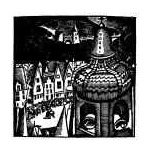
The Rhone to the Thames to the Tiber
EVANGELICAL, EPISCOPALIAN, CATHOLIC
When I was eight years old my best friend informed me that I was going to Hell since I had not been baptized. He had been raised in a devout Missouri Synod Lutheran home and knew well enough that he belonged to Christ through baptism. I, on the other hand, had not been raised in any Christian tradition, nor had I been baptized. It seemed, then, that I would not be saved, nor could I be saved. Baptism remained for me something mysterious and unattainable.
My family was not Christian but was generally virtuous. My mother forbade certain shows and movies as inappropriate for little ones. Lying and stealing were condemned and traditional values upheld. Nevertheless, religion was lacking. My maternal grandfather abandoned his childhood Lutheran faith when the pastor publicly rebuked him regarding his tithe. My maternal grandmother left her childhood Catholic faith when she witnessed a priest scold a pregnant friend who turned to the Church for help after she had conceived out of wedlock. My paternal grandfather died while my father was a boy and, as a result, my father did not receive any religious education. Both my parents were spiritual orphans and, as my Lutheran friend observed, I had not been baptized and was heading toward eternal damnation.
All this changed when I was twelve. I received a baseball autographed by the catcher of the Texas Rangers, Darryl Porter. Under his name he had written: “Rom 10:9.” I was eager to decipher his secret message for me, and I soon found out that this code word was a Bible verse. When I finally got hold of a Bible and found Romans chapter 10, verse 9, my heart filled with joy as I read these words: “If you confess with your mouth, ‘Jesus is Lord,’ and believe in your heart that God raised him from the dead, you will be saved.”
At last, I thought, I’ve discovered a way to be saved!
Immediately I said aloud, “Jesus is Lord” (since the Scriptures instructed “with your mouth”). I uttered my first prayer to God, confessing that God raised Jesus Christ from the dead. I didn’t know what these words meant, but I knew that I wanted to be saved and that I’d discovered a way of salvation without the apparent prerequisite of baptism.
I was eager to learn more about Christianity, so I began to ask questions. I wanted to know about Baptists, Lutherans, Methodists, and Catholics. I discovered the meaning behind holidays like Christmas and Easter. Before long our whole family was attending services together at the nearby church, a Methodist congregation. During this time I felt that God was calling me to become a pastor.
One day a well-meaning evangelical Protestant camp counselor told me that I must read the Holy Scriptures every day because the Antichrist would soon arrive and confiscate every copy of the Holy Bible remaining on earth! In the days of tribulation, he explained, the only Scriptures we would possess would be those we hid in our hearts through memorization. As a 16-year-old looking for spiritual direction, I took his admonition seriously. In the next two years, I read the entire Bible from Genesis to Revelation three times consecutively.
In time I discovered that there were “liberal” and “conservative” churches. As it was explained to me, “liberal” churches follow reason, and “conservative” churches follow Scripture. I certainly wanted to be one of the faithful Christians who followed Scripture.
I visited a charismatic congregation and was impressed by the “altar calls.” At the end of every sermon the pastor would ask all present to close their eyes and bow their heads. He next addressed those who were not Christians or who needed to recommit their lives to Christ. Then he would call them forward. These penitents often cried while the music roared. I found this all very impressive. But after about three months, I noticed that the same people “got saved” week after week. The routine increasingly appeared formulaic. I desired something deeper.
You May Also Enjoy
My 20-year smorgasbord of denominational affiliations, which I had always regarded as a rich blessing in plurality, became a millstone around my neck.
A history of British “literary converts” is a story of spiritual inspiration over the course of the “age of unbelief” that constitutes the full run of the 20th century.
What happened during the thousand years from Constantine to Jogaila that made Europe Christian? And how did it work?

